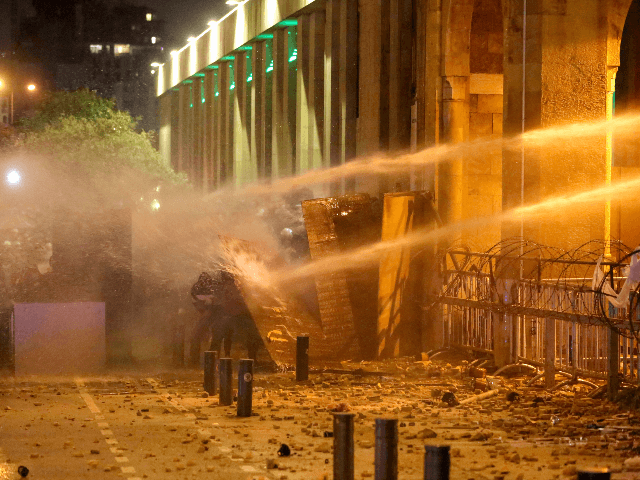Protests in Lebanon turned violent again over the weekend, with over 400 injuries reported. There were several claims of security forces using live ammunition against protesters in addition to water cannons and tear gas.
AFP reported the demonstrators became especially incensed on Sunday after the military decided to parade armored vehicles and heavy weapons past a Beirut mosque during the call to prayer. The evening ended with violent clashes across the city, volleys of Molotov cocktails and tear gas grenades, and crowds of protesters forcing their way into downtown shops and offices that are linked to wealthy politicians accused of corruption.
The police were criticized for excessive use of rubber bullets during the ensuing demonstrations. Reporters from several news organizations reported being injured by rubber rounds. Photos were posted on social media showing gruesome face and head injuries from rubber rounds.
An American reporter named Nicholas Frakes was arrested on Sunday night and handed over to military intelligence on charges of “leaking news to Israel,” specifically the Israeli news organization Haaretz. Transmitting information to Israeli media is considered a crime in Lebanon, which is technically at war with Israel.
Other journalists tried to defend Frakes by arguing that his photos and video were actually given to Reuters, not Haaretz, but he was still in the hands of military intelligence as of Monday afternoon amid growing fears he would be abused during interrogation.
Reuters reported an ugly scene at the fortified area in central Beirut where many government offices are located. Some demonstrators attempted to climb over the barbed-wire fence, while others used poles to push back police officers massed on the other side. Military patrols eventually reinforced the police and pushed protesters away from the government area.
The police reportedly released nearly everyone arrested for rioting on Saturday and Sunday, but public resentment against security forces grew, with many Lebanese complaining about excessive force and intimidating displays of military hardware.
NBC News reported the protesters were armed with flares, fireworks, metal bars, and even tree limbs employed as cudgels. While human rights organizations joined demonstrators in condemning the “brutal” police response, security officials complained that violence against their troops did not receive appropriate attention.
“For the protests to turn into a blatant attack on the security forces, public and private properties, this is condemned and totally unacceptable,” Lebanese Interior Minister Raya El Hassan said on Twitter.
“There was no justification for the brutal use of force unleashed by Lebanon’s riot police against largely peaceful demonstrators in downtown Beirut. Riot police showed a blatant disregard for their human rights obligations, instead launching teargas canisters at protesters’ heads, firing rubber bullets in their eyes and attacking people at hospitals and a mosque,” Michael Page of Human Rights Watch argued in return.
Lebanese President Michael Aoun held a security meeting on Monday with El Hassan in attendance, along with the heads of various police and military forces, to coordinate a response to the ongoing protests.
A widely cited reason for the stormy weekend was frustration and disappointment at Prime Minister Hassan Diab’s failure to form a government on Friday as anticipated. Diab was appointed to the position exactly one month ago after his predecessor Saad Hariri resigned but has not been able to put a government together, leaving Hariri in office as a caretaker.
“There is a way to calm the popular storm. Stop wasting time, form a government and open the door to political and economic solutions,” Hariri said on Sunday, although Lebanon’s political system has collapsed so thoroughly that it’s not clear exactly who he was talking to. Diab, a relative political neophyte and academic, was elected as prime minister by parliament with heavy support from Hezbollah, the Iran-backed terrorist group despised by others in Lebanon but unwilling to relinquish any of its power. Hariri’s Future Movement party, the largest in parliament, decided not to endorse anyone for the job.
“We don’t accept the government the way they are forming it. They are using the old method to form the government … so it’s not acceptable. We want a different way of forming a government,” one of the protesters told NBC News on Sunday, relaying a common sentiment among the disgruntled population.

COMMENTS
Please let us know if you're having issues with commenting.